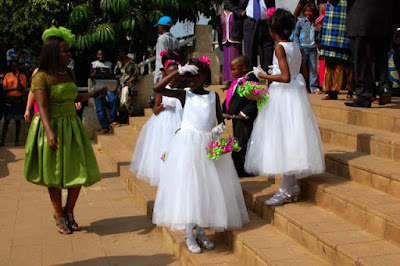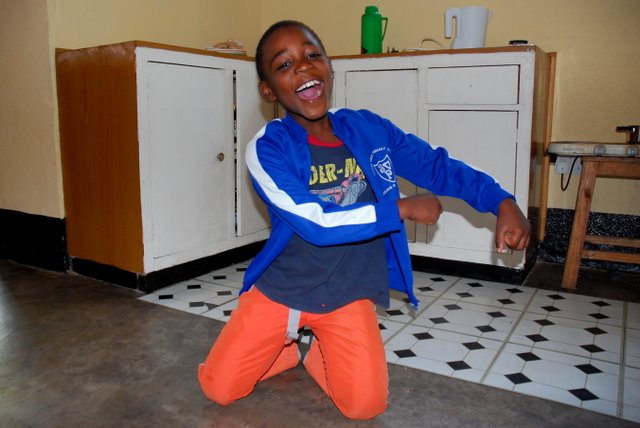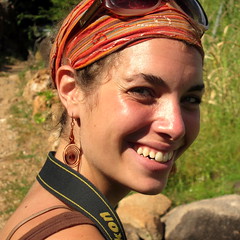Though I've been writing weekly, I figured it was about time to give the scoop on daily life in Malawi. My Glimpse entries have given a few details of the everyday, but there's far more to say.
Daily life in Blantyre is by turns hilarious, frustrating, surprising, exhausting, sluggish, speedy, heartening — I could go on. The city is remarkably compact and I run into friends and acquaintances regularly. Life in Lilongwe would be tough without a car, but Blantyre is (usually) easily navigable by foot and by minibus. While the pace of life is generally slow (things rarely start on time, shops will take two-hour lunch breaks, people can be difficult to reach, accomplishing anything on the Internet takes ages, lines at the supermarket stretch to remarkable lengths), some tasks feel instantaneous. An informal economy means I can buy my bananas or mangoes (or metal chains or cell phones or chickens or strips of rubber or milk or kittens) on the sidewalk while walking through town — no need for a market detour. Access has rarely been an issue, either. I've spent time at the organizations I'd contacted from the States, tagged along for an HIV/AIDS outreach program in rural Mulanje, observed interactive theater training in Zomba, and watched (and participated in!) dance rehearsals.
That brings me to the progress of my project. Progress may be an overstatement. Or maybe not — after a few initial hitches, I have a short-term plan. I began by observing the dance rehearsals of various traditional dance groups in Blantyre, and I finally worked up the courage to participate. I felt ridiculous during that first rehearsal, but I had a fantastic time. The dancers were supportive and welcoming. "Come back next week!" one called as I left. "We love you!" Though my plans to attend regularly this week were derailed by travel and a nasty cold, starting next week I'll be dancing most weekdays (thank goodness — I haven’t really gotten proper exercise during my first month in Malawi). I’m not sure I'll ever be able to shake my rear like the local women, but I'll keep at it. Many Malawian dances are gender-divided, which makes for an interesting dynamic during rehearsals (simultaneous senses of solidarity and tension). I've found some of the men's dances more compelling — they incorporate more upper-body movement than the women's dances. Think they'll let me cross the gender line sometime?
I have yet to assemble a group of young women, but I've made a bit of headway with the gender prong of my project. I observed a women’s community theater group today, and I think I'll be able to draw some ideas from the workshop. I also learned about a gender-based NGO in Blantyre that runs a number of local girls' clubs, so that should prove a beneficial contact.
I'm excited to develop a daily routine. Waking up without a plan can be exhausting. I've found ways to fill my time, but my days have had little regularity. I go to the market, looking for vendors who have sold to me before — if they recognize you, you can often ask for a discount. I bought cucumbers from quite the character yesterday. He told me his name was Forest (Foster? Faster? Something with an F) Fantastic, and that if I come back, he'll offer me a good deal on gingerroot. (Speaking of odd names, I met a security guard named Sixpence the other week.) I'm tentative about bargaining — while it's expected at the clothing markets, produce prices are more firmly set. But I do sometimes. Yesterday I dropped the prices of bananas (bought a really lovely bunch) and tomatoes. Actually, the prices of the latter simply dropped when I looked skeptically at the pile of five tomatoes. "100 Kwacha," she said. "Ah, 80 Kwacha," she conceded. (It's 160 Kwacha to the dollar.) I should have bought one of the huge baskets on the way back to Blantyre from Zomba last weekend — about 15 tomatoes for 50 Kwacha. The vendors stack the produce into impressive piles. Though this means you have to inspect the undersized or bruised vegetables relegated to the bottoms of the mounds, it makes for a wonderful tableau. We've moved into mango season here — six or seven for a dollar. There are both the standard green-skinned ones you see in the U.S., as well as petite yellow-skinned mangoes, stringy and very sweet. I'm yet to buy any exotic produce, but I'll hopefully be able to collect some from my yard soon. There’s a masuku tree right outside my door, and guavas and granadillas grow a few steps away. Panashe, the 11-year-old Zimbabwean girl who lives in the guesthouse adjoining mine, usually gets to the ripe fruit first, but maybe I'll convince her to share.
How else do I fill my days? I hang out with eight-year-old Nigel (see my last Glimpse entry) and six-year-old Eme. I run errands. I take cold (sometimes lukewarm!) showers. I've met various people involved with dance or gender work here, including a British dancer, a women’s drama group, and the head of a Malawian theater organization. I scratch mosquito bites. I read. And read and read. I walk. A lot. I wither in the heat. I try to do a better job of handwashing my clothes than I did in Romania (no major detergent streaks yet, so it seems I've improved). I listen to the BBC (I bought a radio last week, which has revolutionized my news awareness). After developing a bit of a Ben Franklin early-to-bed, early-to-rise pattern in Lilongwe, I've eased up on the early wakeups and bedtimes. Never mind the burning piles of trash on the roadside, the name calling I receive (I'm every family member you could imagine — baby, sister, mama), the ramshackle huts in Blantyre's townships, the tailors on the sidewalk working at their old-fashioned sewing machines, the minibuses that remind me more of rickety rollercoasters than of any road vehicle — one of the most challenging adjustments has been the early nightfall. It's dark (and I mean dark, nighttime dark) by 6 p.m. The compound where I live has a generator — a real stroke of luck, because power shortages can occur daily. It's frustrating, though, to have to hurry home by sunset. It's not safe to walk around alone at night, and I dislike reliance on taxis. I live a few hundred feet from Mustang Sally, a popular bar, and I've had to get rides or find a group of guys to walk with me.
But I shouldn't overstate that nuisance. During daylight, Blantyre is a safe city, and a bit of caution and planning at night is all that's necessary. The nightlife scene is low-key (though I have taken a few 3 a.m. cab rides home). I’ve been mostly to bars with mixed Malawian/expat scenes, but Thoko has promised to show me some of the local dives. I miss Oregon microbrews with a fierceness only a Portlander could feel. It's all Carlsberg here, all the time — the only Carlsberg brewery on the African continent is located in Blantyre. Ok, there's Chibuku as well (traditional gruel-like African beer made from maize). I have yet to try it, but I have plans to make it. Stay tuned.
What else? After informal lessons with Eme and Nigel, I'm beginning proper Chichewa classes soon. At the moment my vocabulary is limited to soccer cheers, greetings, and food names (I taped labels on everything in my kitchen today). I did, however, succeed in delivering this sentence to Nigel yesterday: "Ndinadya mbuzi ku Zomba." Turns out I wanted this sentence: "Ndinadya nyama ya mbuzi ku Zomba." The latter translates to "I ate goat meat in Zomba" (true). The former indicates that I consumed an entire goat (not true).
I also learned the phrase "vuula akugwa" yesterday — "it's raining." It did indeed rain, a harder rain than we've had so far. The rainy season has been a mere tease so far, but it'll hit soon. I'm looking forward to it. Even today, the little bit of rain cleared the dust (all right, and turned much it to mud). The purple jacaranda flowers have fallen, so we need the color the rains will bring. The flamboyant trees in the yard have started to bloom. I'm especially excited for the green (miss you, Oregon).
And that's life, I suppose. There's more to it, of course, but this entry has meandered long enough. If you've got questions about Malawi, ask! I'm curious to know what interests people outside this little sliver of a country.























































